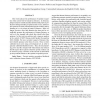Free Online Productivity Tools
i2Speak
i2Symbol
i2OCR
iTex2Img
iWeb2Print
iWeb2Shot
i2Type
iPdf2Split
iPdf2Merge
i2Bopomofo
i2Arabic
i2Style
i2Image
i2PDF
iLatex2Rtf
Sci2ools
ICASSP
2011
IEEE
2011
IEEE
Calibration and weight of the evidence by human listeners. The ATVS-UAM submission to NIST HUMAN-aided speaker recognition 2010
This work analyzes the performance of speaker recognition when carried out by human lay listeners. In forensics, judges and jurors usually manifest intuition that people is proficient to distinguish other people from their voices, and therefore opinions are easily elicited about speech evidence just by listening to it, or by means of panels of listeners. There is a danger, however, since little attention has been paid to scientifically measure the performance of human listeners, as well as to the strength with which they should elicit their opinions. In this work we perform such a rigorous analysis in the context of NIST Human-Aided Speaker Recognition 2010 (HASR). We have recruited a panel of listeners who have elicited opinions in the form of scores. Then, we have calibrated such scores using a development set, in order to generate calibrated likelihood ratios. Thus, the discriminating power and the strength with which human lay listeners should express their opinions about the sp...
| Added | 21 Aug 2011 |
| Updated | 21 Aug 2011 |
| Type | Journal |
| Year | 2011 |
| Where | ICASSP |
| Authors | Daniel Ramos, Javier Franco-Pedroso, Joaquin Gonzalez-Rodriguez |
Comments (0)

